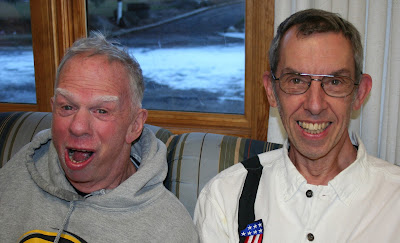I had limited exposure to people with intellectual disabilities
when I was growing up.
There was a teenaged boy named Jeff in the house down the
road from my childhood home. Whenever I saw Jeff, he was with a parent, he was protected
by a very large, growling guard dog, and he was making noises that sounded to
my young ears like agonized moaning. I walked by his house every day with my
head down, hoping that I looked deep in thought, hoping that he, or his dog,
wouldn’t notice me.
Then there was another teenaged boy named Eddie. He was the
son of an out-of-state friend of my parents. I heard stories about Eddie
throughout the years, but I only met him one memorable time.
I didn’t know how to act around Eddie the time we visited. I
was fifteen and, being a girl, very self-conscious.
I tried to talk to him
once, but he didn’t say anything – he just stared.
I smiled once, but he didn’t
smile back – he just stared.
I wanted to ride his dirt bike around the yard, but
when I asked, he didn’t shake his head or nod or anything – he just stared.
And
this wasn’t the “wow, I think you’re cute!” kind of staring. It was the kind
that had me running for the nearest mirror to do the nose check, hair check,
teeth check, girlie paranoid thing.
So my very limited exposure to people with intellectual
disabilities caused me to form a faulty perception, which was people with intellectual disabilities are
unapproachable and very sad. They spend their days moaning, staring and separated from other people.
This perception wasn’t challenged until I started working at
Shepherds. I saw that people with intellectual disabilities had personalities
and character and charm.
They had many moods, and sad was only one of them.
They moaned once in a while, maybe when the lunchroom ran
out of pizza and they had to eat beef stew instead, but there was also chatter,
bickering, smiles and laughter that filled the hours every day.
And rarely – rarely
– did I see anyone just staring. Our
people were engaged on all levels – mentally, physically, emotionally and
spiritually.
If anyone reading this blog currently shares the erroneous
beliefs from my pre-Shepherds years, I invite you to visit our campus. Meet our
people. Eat a meal with them at the Shepherds Table. Spend an evening singing bad
karaoke with them. Talk to them about their families and God and their favorite
dessert at Dairy Queen. They have a lot to say.
Sure, some people with intellectual disabilities communicate
non-verbally. Some of their noises sound an awful lot like moaning. But stop
for a moment and really listen. Watch their expressions and listen to the
inflections in their voices. They have something to tell you. They are excited.
They are angry. They have a story. Hear them.
And some people with intellectual disabilities stare. I do
too when I’m writing, when I’m gazing inward at all the words floating across
my mind like the messages in the window of a Magic 8 ball. I’m sure I’ve
freaked out every single one of my co-workers. But when our residents stare, don’t
let it unnerve you. Look deep in their eyes and acknowledge them. Appreciate the soft
gaze of satisfaction deep within. Or notice the pinch of confusion or the light
of curiosity. Just don’t turn away in discomfort as I once did. See them.
I wish I could take all that I learned at Shepherds in the
last six years and give it to the little girl who wanted to be nice to Jeff,
but didn’t know how. That little girl would have asked Jeff’s dad if she could
sit by the pond in their front yard with Jeff and talk about how crazy the
ducks got when someone threw bread in the water, or her amazement at the big
hill in the center of their driveway. Did Jeff ever want to sled down it in the
winter the way she did?
I wish I could tell my teenaged self that Eddie was staring
because girls didn’t usually come over to his house. He didn’t realize that
hair could be teased so high, and I didn’t realize how distracting my big,
sparkling earrings were to someone with sensory issues. I’d like to think that
my teenaged self would have been less self-absorbed and more patient, that I
would have smiled more than once, or asked him more than one question. Or maybe
I should have stared back to let him know that I was aware of him and wanted to
take the time to figure out this whole new form of communication.
It took the people of Shepherds to teach me that disability
doesn’t equal sadness and separation. Disability is just one tiny part of the richness of our
human experience. The other parts? Purpose, faith, friendship, community, learning,
talents, strengths, weaknesses, adventure, promise, love, loss, communication,
caring… it’s all there in every one of us.
Shepherds changed my beliefs about disability.



















love the article. I worked at Shepherds and it changed me and my outlook completely.
ReplyDelete